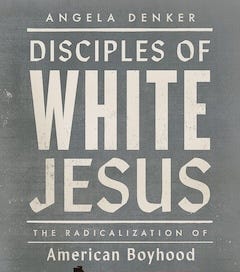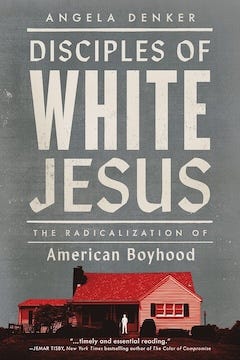Angela Denker's Disciples of White Jesus
Further explorations in the "what's wrong with men" genre
A couple of weeks ago, I wrote on research by Paul Djupe and his colleague that spoke to the perceived victimhood of young men. It was one more arrow in the quiver of trying to make sense of the whole “what’s wrong with me” argument. I wrote:
I keep thinking that I need to write a SubStack post — or a series of posts — trying to make sense of the whole “crisis of men” argument. Sure, changes in macroeconomic structures have made life harder for men without college degrees. Or maybe the bro-culture around online video games and sports betting and crypto is about forming a new sense of belonging. Or maybe it’s a matter of stamping their feet because women are outpacing them and not “staying in their place”. Or because somehow calling out toxic masculinity among some (the Tate brothers?) gets splashed onto all (why would they be so susceptible, I wonder?).
That same day, I saw reminders of Angela Denker’s new book: Disciples of White Jesus: The Radicalization of American Boyhood. I ordered it right then and my copy arrived on the 11th (even though the published release data is next week). I finished it over the weekend.
I really enjoyed Angela’s earlier book, Red State Christians and was looking forward to her take on the “boys” question (especially since she is the mother of two boys) as she used her journalistic skills. Plus, she used to be a sports reporter. And also a Lutheran minister.
Her introduction explains the rationale for the title. It’s not about blaming Christians or white people. It is rather about a particular image of Jesus that has been created and promoted that is having an impact on young men.
There is a movement afoot in America that says in order to protect and “save” young boys and men, they must become disciples of the movement of White Jesus. Unlike Jesus Christ, White Jesus deals in absolutes, and those who are among the “chosen” are absolutely convincted of their own sanctification and worthiness, and the damnation of all those who disagree. White Jesus is boorish and controlling, positioning himself at the head of the family and the government, at the top of the hierarchy, ignoring the truth that the Trinity of God taught by Orthodox Christianity is necessarily reciprocal and relational, requiring three coequal parts of God, traditionally known as Father, Son, and Holy Spirit. (xii)
She starts the book with a trip to South Carolina. While there, she visits Mother Emmanuel Church, where Dylan Roof killed nine people following a Bible study. She also visits the Lutheran church where the Roof family occasionally attended. And she visits The Citadel, the military academy known for a rigid style of masculine identity1.
It’s probably no big surprise that there is a chapter centering on Mark Driscoll and what she calls Angry Jesus. Eldridge’s “Wild at Heart” also makes an expected appearance. Reading this section of the book, my mind went to season three of The Righteous Gemstones, when Kelvin Gemstone creates a ministry of tough, muscular guys who break things (and he pretends to be one of them). About halfway through the book, Angela writes;
Those who are not white men and boys, who are victimized by the dominant groups’ propensity and glorification of violence and anger, suffer its consequences quickly and painfully. Their suffering grounds our shared responsibility to combat gun violence, mass shootings, domestic violence, and hate crimes. For my purposes here, I also want to make clear that violent masculinity, despite its popularity on social media and right-wing politics, isn’t good or helpful for young, white Christian men and boys either. (98)
She has a chapter extolling the work of teachers, coaches, and youth leaders who demonstrate a more healthy version of masculinity and serve as important role models for those in their charge. It appears that there is a formative period in adolescent development where a more balanced view can be nurtured provided good leadership.
She shares a remarkable story from a Midwestern pastor who was conducting confirmation classes for a group that included some early teen boys.2 The pastor introduced an icebreaker, asking “If you were God, what would you include [at the point of creation] that God didn’t?”. Being pre-teen boys, their first response was to be invisible so they could go in the girls’ locker room! But as the lesson went on, the boys’ conversation shifted to who would NOT be included in their version of God’s creation: North Koreans, Mexicans, Russians, African-Americans (unless they are servers), or Jewish people. Women could still be there as long as they were naked.
What started out as pre-teen joking around began betraying the view of a predominantly white, male culture. The story ends with the pastor recounting: “They were glad that they hadn’t done the creating, because they would have created something bad. (125)”
Angela’s penultimate chapter tells the story of Caleb Campbell, pastor of Desert Springs Bible Church in the greater Phoenix area. That name rang a bell because Caleb was the subject of Ruth Braunstein’s podcast “When the Wolves Came” that I wrote about in my piece two weeks ago (and have since listened to episodes two and three — it’s great!). Angela’s telling of Caleb Campbell’s story starts much earlier than the podcast: exploring his upbringing, his move into skinhead culture, how he played drums in a worship band, and eventually became pastor. As he reflects on his journey, he shares a crucial insight known to sociologists everywhere.
“Phase one is you’re in the group,” he said. “Phases two and three you’re wearing the costume. Phases four and five is you’re doing violence.”
As he had told me earlier, the belonging came first — and the activity and ideology went hand in hand. De-radicalization, then, is a process not primarily of the mind but of the heart. (170)
Even when Angela Denker is telling stories of people like Dylan Roof or Caleb Campbell’s skinhead period or the boys reimagining Creation, she does so with compassion. Things didn’t need to turn toward radicalization. A supportive environment, a real sense of belonging, calling out problematic behavior, and celebrating compassionate engagement with others can make a real difference in resolving “the problem with boys”.
I’m writing this on day two of March Madness. Disciples of White Jesus encourages me to root for the well-rounded players — win or lose — and not get sucked into celebrating every time the announcers extol the way that a team is “getting physical”.
Which, by the way, is where Nancy Mace went to school, which may explain a lot!
I’m told I need to watch Adolescence on Netflix. I plan to do so this weekend and may return to the “what about boys” topic next week.




